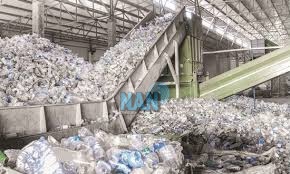The Pan African University Life and Earth Sciences Institute (PAULESI), University of Ibadan, has commenced a training workshop for students on solving plastic problems in society.
The Director of PAULESI, Prof. Titilayo Akinlabi, stated this in an interview with the News Agency of Nigeria (NAN) in Ibadan, at the end of the showcasing and training sessions held at the permanent site of the institute.
NAN reports that the training on transforming waste plastics to wealth using a 3D printers was funded by the British Council, in collaboration with De Montfort University, Leicester; PAU Institute of Life and Earth Sciences; and Co-Creation Hub.
“The main aim of this British Council-Innovation for African Universities Project is to see how Nigerian universities can foster innovation and entrepreneurship for the circular plastic economy.
“To do this, a lot of activities had been carried out, which included sensitization and ideation sessions that explored the theoretical aspect of the circular plastic economy.
“This training, therefore, presents a fantastic opportunity for the students to experience the practical aspect of the project and explore a method that can effectively transform waste to wealth,’ Akinlabi said.
According to her, it also exposed students to the innovative concept of 3D printing, which many may not be aware of. She said that the training, thereby opens the minds of the students to possible entrepreneurship opportunities that can present themselves through learning this art of 3D printing.
The don said that the training was open to all categories of students – from primary, and secondary to tertiary education students.
“The concept of 3D printing is one that is quite easy to grasp and as such, students at any stage of their education can benefit from this knowledge.
“We welcome UI students who are interested to come to the PAULESI building at any of the stipulated times to participate. We hosted a virtual session that allowed attendees from various other universities across Nigeria,” she said.
On the impact of the circular plastic economy project on Africa, Akinlabi said, “the entire project is immensely beneficial for Africa as it brings to light the menace of plastic waste.
“But also offers possible innovative and entrepreneurial opportunities, through universities, that will help to curb this menace.
“In the course of this project, funding has been awarded to a group of students in Obafemi Awolowo University, Ile-Ife, Nigeria, who have a fantastic proposal that will help tackle this problem.
“In the hopes of achieving sustainability of this project, more funding opportunities can be offered, which will contribute to achieving the aim of a circular plastic economy in Africa.”
Also, Mr Adebukola Omotosho, a Senior Educator with STEM Café, a sister company to CCHub, said that the training sessions were on how waste plastic products littering the environment could be repurposed.
Omotosho said that, “we are looking at ways of getting the plastics off the streets and using them to do something useful and meaningful.
“It is about recycling. We collect plastics, we grind and process them. We use them to create 3D filament which we use to create other things.”
He added that “plastics are not biodegradable. If you throw plastic out there today, in 10 years you would still find it there.
“It is not going to decay and that is killing the environment. This is one of the things that are causing environmental issues such as global warming.”
Elijah Gbogbo, a Mechanical Engineering student from the University of Ibadan, described the training workshop as exciting and innovative.
He said, “I can now put the waste plastics into good use.” (NAN)
